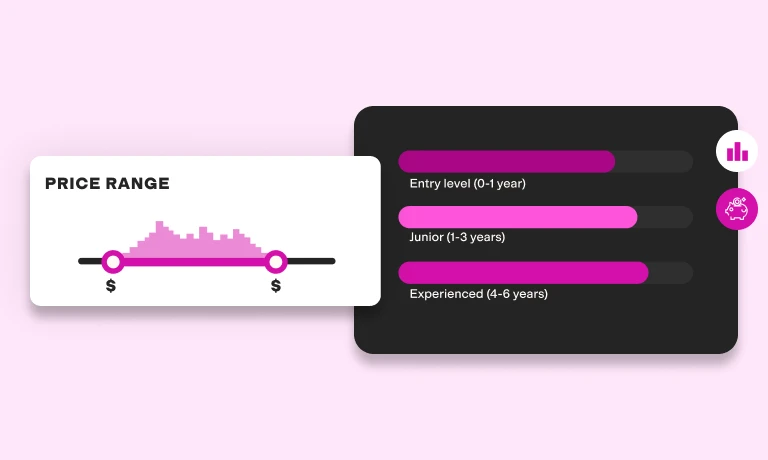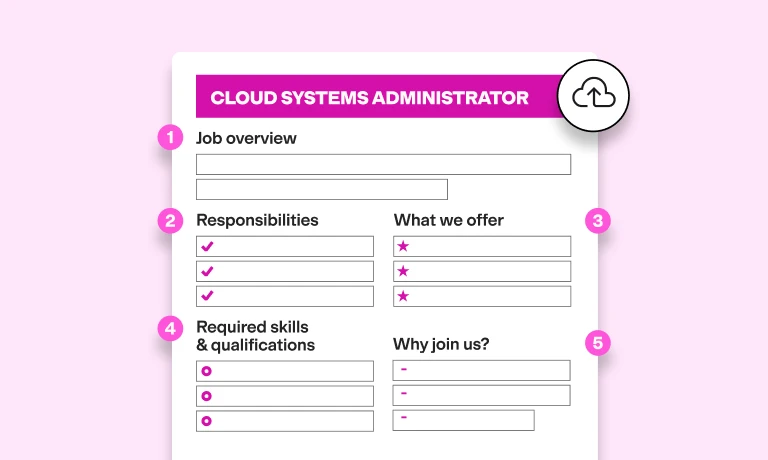Numerical reasoning is one of the most sought after skills, especially for roles in tech, finance, engineering, and accountancy.
For this reason, businesses today need to be able to assess it accurately when hiring new employees, and not leave any place for guesswork.
With online job boards and remote work, it has become much easier for candidates to apply for a job.
But that has also made companies’ task of finding the perfect candidate much harder, too.
For attractive positions at top tech companies, HR staff can receive hundreds of applications, making their job of sifting through resumes harder, longer, and more costly.
That’s where online skills assessments come in.
A numerical reasoning test can help you quickly and easily filter out candidates who don’t have the necessary skills to succeed at your organization, and concentrate on the ones who do.
A numerical reasoning test will help you easily evaluate candidates’ numeracy skills, as well as their ability to use those skills in a wide range of applications, making it a great addition to your hiring tools. A numerical reasoning test has more to it than meets the eye, though.
In this article we’ll explore the details and see how and why you should use one in your hiring process.
Table of contents
- What is a numerical reasoning test?
- What are the different types of numerical reasoning skills that tests assess?
- What do numerical reasoning tests measure?
- What are the benefits of a numerical reasoning test?
- Which roles do you need a numerical reasoning test?
- When should you use a numerical reasoning test?
- Why should you use TestGorilla’s Numerical Reasoning test?
What is a numerical reasoning test?
First of all, a numerical reasoning test isn’t a math test. A math test measures the candidate’s math syllabus, while a numerical reasoning test measures the candidate’s ability to interpret numerical information correctly.
The applicant uses their numeracy skills to solve problems presented in front of them and make decisions that will be relevant in the workplace. In most cases, the problems presented in the test are similar to the problems that applicants will face at work.
Numerical reasoning is closely related to critical thinking and problem-solving skills. To pass a numerical reasoning test, the applicant has to be able to:
Effectively identify business-related issues
Use numerical data (figures, results, reports) to draw logical conclusions
Extract data from charts and tables and make sense out of them
Present the data to stakeholders using charts and tables
What are the different types of numerical reasoning skills that tests assess?
If you want to evaluate candidates’ numeracy skills, you’d most likely use a test that assesses the following:
Interpretation of graphs, tables, and charts
Arithmetic operations, such as:
addition
subtraction
multiplication
division
averages
percentages
ratios
Manipulation of data
Interpretation of numerical patterns
The types of questions that can be found on a numerical reasoning test usually fall under four basic types:
Numerical computation questions to test candidates’ arithmetic skills
Numerical estimation questions to test candidates’ ability to estimate and answer numerical problems quickly
Numerical reasoning questions, where candidates are presented with data, but the method and answer to solving the posed problem isn’t explicitly specified
Data interpretation questions, where candidates need to interpret data coming from line graphs, pie charts, and tables, in order to answer
The best insights on HR and recruitment, delivered to your inbox.
Biweekly updates. No spam. Unsubscribe any time.
What do numerical reasoning tests measure?
Pre-employment numerical reasoning tests like the one from TestGorilla measure candidates’ ability to:
Identify processes and make critical numerical analyses
Draw logical conclusions out of data and present them
Monitor business results by going through relevant data
Communicate critical business needs using charts, data, tables, and graphs
Think critically when it comes to data
Assess, prepare, and communicate numerical estimates
Make correct evaluations quickly
Concentrate on the task at hand to find the correct solution and solve the problem
What are the benefits of a numerical reasoning test?
Aptitude tests, such as numerical reasoning tests or verbal reasoning tests that evaluate competence, are generally better predictors of job success than CVs or even (years) of experience, especially for more complex roles.
One of the major benefits of the numerical reasoning test is that you will accurately (and objectively) assess the candidate’s numeracy skills and how they will implement them at your workplace.
Which roles do you need a numerical reasoning test?
There are several roles and industries in which a numerical reasoning test administered during the hiring process would be very useful. These include:
Accountancy: Accountants need to be able to extract numerical data and make sense of it
Engineering: Engineers need top-notch numerical reasoning skills to be successful in their job
Architecture: As with engineering roles, architects need to have excellent numerical skills
Banking and finance: The ability to predict trends, read patterns, and solve problems is essential for the banking & finance sector
Sales: A salesperson needs to be able to calculate and interpret data swiftly and accurately
Marketing: The ability to present data using graphs and charts is a must-have in marketing
As you can see, numerical skills are essential for many industries, and contrary to popular belief, they aren’t relevant only for purely technical or financial roles. This means that accurately evaluating candidates’ aptitude to work with numbers is crucial for recruiters in many industries—and a numerical reasoning test is one of the best ways to do that.
When should you use a numerical reasoning test?
A numerical reasoning test can help you during hiring, by enabling you to quickly assess who are the candidates who have the right skill set for the role.
It can also be a valuable tool for your onboarding process, or even be used to improve your learning and development initiatives.
Let’s look into the different instances when a numerical reasoning test can be a valuable resource.
During the hiring process
A numerical reasoning test is an aptitude test you can give to your job applicants to assess their numerical skills and shortlist your best candidates for an interview.
The best thing about it is that you can give the test in an online form, before the interview, and simplify the hiring process tremendously.
If you use TestGorilla’s Numerical Reasoning test, you get the score calculated automatically for you.
With a numerical reasoning test, not only do you save your candidates’ time, but you also save yourself the time of going through interviews with unqualified candidates. It’s much easier to interview 5 people than 100.
For the best results, we recommend combining a numerical reasoning test with other pre-employment skills assessments, such as:
You can combine up to five tests in a single assessment and then compare candidates’ scores to see who has the biggest performance potential for this role. With TestGorilla, you can easily adapt the assessment to the requirements of the position you’re hiring for—or even use custom questions.
Tests will then serve as a benchmark, allowing you to analyze your candidates’ strengths and select the most skilled applicants to invite to an interview.
To guarantee a positive candidate experience, make sure you let the unsuccessful candidates know that you won’t be proceeding with their applications: 75% of companies still don’t do that, and it’ll help you stand out.
During onboarding
Using skills tests during the hiring process will help you accurately assess your future employee’s strengths, and tailor your onboarding process to their results.
A numerical reasoning test will give you precise information about your best applicant’s numeracy skills, and will allow you to customize your training sessions based on that.
For example, they might be particularly skilled with budgeting and creating estimates but need some help with charts and diagrams. A numerical reasoning test will help you address that proactively.
Learning and development
Numerical reasoning tests can also be very helpful when developing new learning and development initiatives.
For example, tests can help you see whether your employees are able to create accurate estimates and budgets, interpret mathematical information, or perform basic data analysis tasks.
Additionally, they can help you assess whether your employees are able to work with numbers under pressure: since the tests are timed, you can evaluate whether your employees are able to interpret data in a timely manner.
This will help you assess the skills of your employees and identify important skill gaps you need to address. You can then use the results to create the right learning and development program to train your employees.
Why should you use TestGorilla’s Numerical Reasoning test?
Our tests, including our numerical reasoning test, will help you accurately predict the performance potential of your candidates, and make the right hiring choices.
There are a couple of things that make them stand out from other tests on the market:
Each test is created by a subject-matter expert: For all tests, we hire subject-matter experts to create assessments that accurately evaluate candidates’ skills. Tests go through numerous rounds of revision, improvement, and calibration, and only after that are they added to our test library.
You’ll be able to streamline your hiring process: Our numerical reasoning test will enable you to make the recruitment and selection process much easier. It’ll help you quickly see who your strongest candidates are. After that, you simply have to invite them to an interview and see who’s the best match.
We offer a positive candidate experience: A positive candidate experience is essential to attracting and retaining top talent, and all our tests are designed with candidate care in mind. Our numerical reasoning test is easy to use and accurately assesses applicants’ abilities without wasting their time (or yours). You can also use the colors of your brand, add a short introductory video, or personalize the invitation emails you send out from the platform.
Our platform is data-driven: If you’re looking to evaluate candidates’ numerical reasoning skills, you know how important data is. TestGorilla ranks your candidates according to their test scores. This helps your HR team get all the necessary information to make data-based decisions instead of choices based on gut feeling, and eliminate unconscious bias from the hiring process.
When picking a numerical reasoning test, get the one that helps you pick the best possible candidate: TestGorilla’s Numerical Reasoning test.
You've scrolled this far
Why not try TestGorilla for free, and see what happens when you put skills first.




















